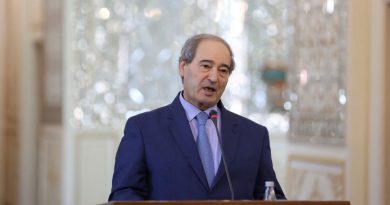U.S. spy chiefs say China is ‘unparalleled priority’
Washington (Reuters) – U.S. spy agency leaders said on Wednesday that China is an “unparalleled” priority, citing Beijing’s regional aggression and cyber capabilities as they testified at a public congressional “Worldwide Threats” hearing for the first time in more than two years.
“Given that China is an unparalleled priority for the intelligence community, I will start with highlighting certain aspects of the threat from Beijing,” Director of National Intelligence Avril Haines told the Senate Intelligence Committee.
She described China as increasingly “a near-peer competitor challenging the United States in multiple arenas.”
Federal Bureau of Investigation Director Christopher Wray said his agency opens a new investigation linked to China every 10 hours.
Haines also cited Russian efforts to undermine U.S. influence, Iran’s contribution to instability in the Middle East, global terrorism and potential North Korean efforts to “drive wedges” between Washington and its allies as significant threats.
The appearance by Haines and the other intelligence directors was the first such public “Worldwide Threats” hearing since January 2019. Former President Donald Trump, who often clashed with security agencies, did not send officials last year to testify at what is normally an annual event.
Democratic Senator Mark Warner, the committee’s chairman, said he was “dismayed” there had been no hearing last year.
Emphasis On Technology
Much of the hearing focused on technology – the threat from hacking, the importance of leading-edge development and the malign influence of social media.
“Today’s technology environment allows adversaries to wreak havoc,’ panel Republican Vice Chairman Marco Rubio said.
Warner noted the effort Beijing had put into making the Chinese firm Huawei a leader of advanced 5G systems, and said he was concerned it might make similar efforts in other emerging technologies.
Noting the dangers of international computer hacking like the recent SolarWinds attack, Warner said: “We may also want to develop new international norms where certain types of attacks are prohibited, just as the use of chemical or bio-weapons is banned.”
Central Intelligence Agency Director William Burns, National Security Agency Director General Paul Nakasone and Defense Intelligence Agency Director Lieutenant General Scott Berrier also testified.
Burns said nearly a third of the CIA’s workforce is focused on cyber issues.
Nakasone and Wray said intelligence agencies could benefit from more information from companies about cyber threats, but did not directly endorse calls from some members of Congress for legislation that would demand more of firms like Facebook and Twitter.
Wray said social media has become “the key amplifier” to domestic violent extremism and malign foreign influence. “The same things that attract people to it for good reasons are also capable of causing all sorts of harms,” Wray said.
U.S. intelligence agencies on Tuesday released a sweeping report on global threats. Disease, the rich-poor gap, climate change and conflicts within and among nations will pose greater challenges, with COVID-19 already worsening some of those problems, the report by the National Intelligence Council said.
The intelligence chiefs are due to testify at a second Worldwide Threats hearing, before the House Intelligence committee, on Thursday.


